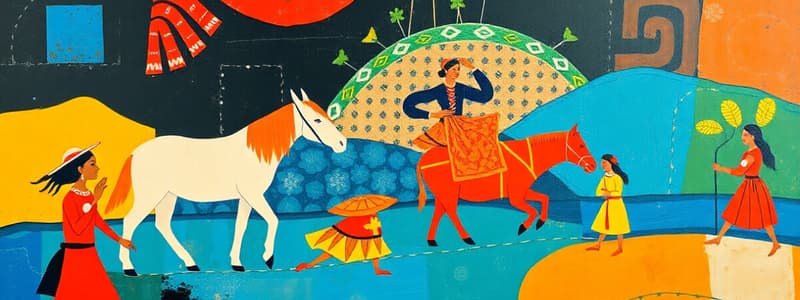Podcast
Questions and Answers
Approximately how many years ago did hunter/gatherer societies emerge?
Approximately how many years ago did hunter/gatherer societies emerge?
- 250 years ago
- 10000 years ago
- 6500 years ago
- 16500 years ago (correct)
What marked the beginning of the clash between hunter/gatherer societies and agricultural societies?
What marked the beginning of the clash between hunter/gatherer societies and agricultural societies?
- The development of modern weapons
- The meeting of these societies approximately 500 years ago (correct)
- The introduction of trade
- The colonization efforts by Europeans
Which society type is noted for developing modern administrative institutions?
Which society type is noted for developing modern administrative institutions?
- Hunter/Gatherer societies
- Nomadic societies
- Agricultural societies (correct)
- Industrial societies
How many years ago did industrial societies emerge?
How many years ago did industrial societies emerge?
What is the timeline of the emergence of these societies, starting from hunter/gatherers to industrial?
What is the timeline of the emergence of these societies, starting from hunter/gatherers to industrial?
What were the primary means of sustenance for most North American societies during the early migrations?
What were the primary means of sustenance for most North American societies during the early migrations?
Which of the following civilizations in South America is noted for having an agricultural society with a hierarchical structure?
Which of the following civilizations in South America is noted for having an agricultural society with a hierarchical structure?
What significant change occurred due to agricultural surpluses?
What significant change occurred due to agricultural surpluses?
How many First Nations groups are recognized today?
How many First Nations groups are recognized today?
John Cabot claimed which region for England in 1497?
John Cabot claimed which region for England in 1497?
When did the earliest recorded contact between the First Nations of Canada and European societies occur?
When did the earliest recorded contact between the First Nations of Canada and European societies occur?
Which two groups do not fall under the classification of First Nations?
Which two groups do not fall under the classification of First Nations?
What time frame is suggested for the earliest human activity in North America?
What time frame is suggested for the earliest human activity in North America?
What significant event occurred during Jacques Cartier's exploration in 1534?
What significant event occurred during Jacques Cartier's exploration in 1534?
What was the relationship between the French and the Iroquois during the time of Samuel de Champlain?
What was the relationship between the French and the Iroquois during the time of Samuel de Champlain?
What was a primary industry established by Samuel de Champlain in North America?
What was a primary industry established by Samuel de Champlain in North America?
Which settlement was established by Samuel de Champlain in 1608?
Which settlement was established by Samuel de Champlain in 1608?
Which two groups allied with each other against the Iroquois?
Which two groups allied with each other against the Iroquois?
How did various European countries interact with the Grand Banks region?
How did various European countries interact with the Grand Banks region?
What happened to the resources sought by early explorers like Cartier and Champlain?
What happened to the resources sought by early explorers like Cartier and Champlain?
What was the outcome of the second voyage in 1498?
What was the outcome of the second voyage in 1498?
Flashcards
Culture Clash
Culture Clash
The process of different cultures interacting and potentially conflicting with each other.
Hunter-Gatherer Societies
Hunter-Gatherer Societies
Societies that relied on hunting and gathering for sustenance, existing before the emergence of agriculture.
Agricultural Societies
Agricultural Societies
Groups that developed agriculture and settled in one place, cultivating crops and raising livestock.
Industrial Revolution
Industrial Revolution
Signup and view all the flashcards
Clash of Hunter-Gatherer and Agricultural Societies
Clash of Hunter-Gatherer and Agricultural Societies
Signup and view all the flashcards
Surplus and Administrative Classes
Surplus and Administrative Classes
Signup and view all the flashcards
First Human Activity in North America
First Human Activity in North America
Signup and view all the flashcards
Environmental Influence on First Nations Cultures
Environmental Influence on First Nations Cultures
Signup and view all the flashcards
Hunter-Gatherer Societies in North America
Hunter-Gatherer Societies in North America
Signup and view all the flashcards
First Nations Groups in Canada
First Nations Groups in Canada
Signup and view all the flashcards
First European Contact in Canada
First European Contact in Canada
Signup and view all the flashcards
John Cabot's Claim
John Cabot's Claim
Signup and view all the flashcards
European Claims to North America
European Claims to North America
Signup and view all the flashcards
John Cabot's Second Voyage (1498)
John Cabot's Second Voyage (1498)
Signup and view all the flashcards
European Fishing in the Grand Banks
European Fishing in the Grand Banks
Signup and view all the flashcards
Early Trade in the Grand Banks
Early Trade in the Grand Banks
Signup and view all the flashcards
Jacques Cartier's Exploration and Claims (1534)
Jacques Cartier's Exploration and Claims (1534)
Signup and view all the flashcards
Cartier's Damaged Relations with the Iroquois
Cartier's Damaged Relations with the Iroquois
Signup and view all the flashcards
Samuel de Champlain's Expeditions and Settlements
Samuel de Champlain's Expeditions and Settlements
Signup and view all the flashcards
Champlain's Settlements and Alliances
Champlain's Settlements and Alliances
Signup and view all the flashcards
Iroquois Allies and Future Conflicts
Iroquois Allies and Future Conflicts
Signup and view all the flashcards
Study Notes
Culture Clash
- Hunter-gatherer societies emerged ~16,500 years ago, agricultural societies ~6,500 years ago, and industrial societies ~250 years ago.
- The meeting of hunter-gatherer and agricultural societies occurred roughly 500 years ago, involving indigenous societies of North/South America and indigenous societies of Europe.
- Early agricultural societies developed formal governance structures due to agricultural surpluses, which allowed for administrative classes to develop.
First Migrations to Americas
- Earliest archaeological evidence shows human activity in North America between 12,000 and 16,500 years ago.
- Diverse cultures emerged, heavily influenced by environmental factors.
- Some South American societies (Aztec, Mayan, Inca) were agricultural with hierarchical structures.
- Most North American societies were hunter-gatherer based.
- Over 600 First Nations groups exist today, with over 50 based on shared languages. Inuit and Metis are distinct groups.
- Contact between First Nations of Canada and European societies is recorded as early as 1000 years ago; the Viking settlement at L'anse aux Meadows.
French and English Lay Claims
- John Cabot claimed Newfoundland for England in 1497.
- Subsequent voyages were intended for colonization but failed to establish permanent settlements.
- From 1497, various European countries engaged in fishing and rudimentary trade off the Grand Banks.
- Jacques Cartier claimed the region for France in 1534.
- Relations with the Iroquois were complicated, and eventually irreparably damaged.
- Samuel de Champlain established the first permanent French settlement at Port Royal (1604) and Quebec (1608).
- Champlain allied with Huron and Algonquian tribes against the Iroquois.
- Fur trade became a vital industry in the New France region.
- The French relied on native allies for success in the fur trade due to lack of dominance and necessary resources.
Studying That Suits You
Use AI to generate personalized quizzes and flashcards to suit your learning preferences.
Related Documents
Description
Explore the significant cultural shifts and migrations in the Americas, from the early hunter-gatherer societies to the structured agricultural communities. This quiz delves into the rise of formal governance and the diverse indigenous cultures that emerged in North and South America. Test your knowledge on these rich historical developments and their lasting impacts.





